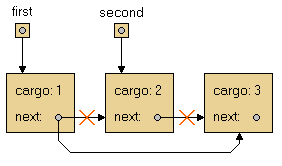| The C++Course provides a general introduction to programming in C++. It is based on A.B. Downey's book, How to Think Like a Computer Scientist. Click here for details. |

|

Home  Linked lists Linked lists  Modifying Lists Modifying Lists |
||






|
||
Modifying Lists
Obviously one way to modify a list is to change the cargo of one on the nodes, but the more interesting operations are the ones that add, remove, or reorder the nodes.
Node *first = list; Node *second = list->next; // make the first node refer to the third first->next = second->next; // separate the second node from the rest of the list second->next = null; return second; } Again, I am using temporary variables to make the code more readable. Here is how to use this method. printList (node1);Node *removed = removeSecond (node1); printList (removed); printList (node1); The output is (1, 2, 3) the original list(2) the removed node (1, 3) the modified list Here is a state diagram showing the effect of this operation.
What happens if we invoke this method and pass a list with only one element (a singleton)? What happens if we pass the empty list as an argument? Is there a precondition for this method?
|
||
Home  Linked lists Linked lists  Modifying Lists Modifying Lists |
||
Last Update: 2005-12-05


